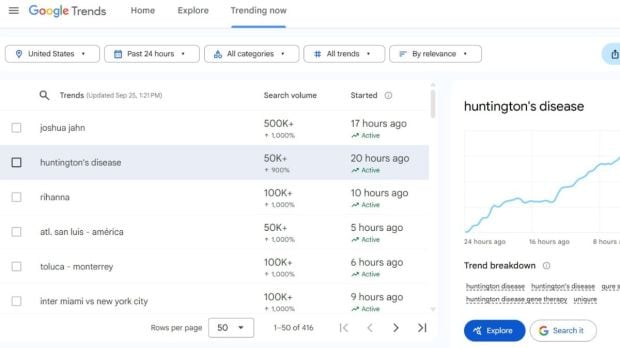Google Trends: For the first time, doctors say they have successfully slowed the progression of Huntington’s disease, a devastating genetic illness that has long been considered untreatable. In a breakthrough trial, a new gene therapy cut the rate of decline in patients by 75 per cent, raising hopes for thousands of families worldwide. The development was widely tracked by people on Google as the searches crossed the 50,000 mark on September 25 at around 1 pm.
“This is absolutely huge,” said Prof Sarah Tabrizi, who led the study at University College London. “We now have a treatment for one of the world’s most terrible diseases.” So, what exactly is Huntington’s disease, and why is this discovery being called life-changing?
What is Huntington’s disease?
As per the study, Huntington’s is a rare genetic condition that runs in families. If one parent has the faulty gene, their child has a 50 per cent chance of inheriting it. The disease is caused by a mutation in the huntingtin gene, which produces a toxic protein that slowly destroys brain cells.
Doctors often describe it as a combination of Alzheimer’s, Parkinson’s, and motor neurone disease rolled into one.

Symptoms of Huntington’s disease
The first symptoms usually appear in a person’s 30s or 40s, often when they are at the peak of their careers or raising young families. Early signs include mood swings, anger, or depression. Over time, people develop uncontrolled jerky movements, difficulty walking, memory loss, and dementia. Eventually, most patients need full-time care.
On average, Huntington’s proves fatal within 10 to 20 years of diagnosis. Until now, there has been no way to slow the disease.
New treatment for Huntington’s disease
The new therapy involves highly delicate brain surgery lasting 12 to 20 hours. Surgeons use a harmless virus to deliver a specially designed strand of DNA deep into two brain regions, the caudate nucleus and the putamen.
Once inside, the DNA acts like a ‘repair kit.’ It instructs brain cells to block the faulty huntingtin protein, preventing further damage. In other words, the therapy doesn’t just treat symptoms, it tackles the root cause of the disease.
What the trial showed
The trial, conducted in the UK and US with 29 patients, showed remarkable results three years after surgery. Doctors reported a 75 per cent slowing of disease progression, with patients able to stay independent for longer while showing improved memory and motor function. Tests also revealed a drop in neurofilament levels in spinal fluid, a clear sign that fewer brain cells were dying.
In real life, this translated into patients defying expectations, one who had retired due to illness was able to return to work, while others, who were expected to need wheelchairs, are still walking. Prof Sarah Tabrizi summed it up, saying, “We never in our wildest dreams expected a 75 per cent slowing.”
‘It makes me think my life could be that much longer’
For families, this breakthrough is deeply emotional. Take Jack May-Davis, a 30-year-old barrister’s clerk. His father and grandmother both died of Huntington’s, and Jack carries the faulty gene himself. Until now, he believed he was destined to suffer the same fate.
“It’s absolutely incredible,” he said. “It makes me think my life could be that much longer. For the first time, the future seems brighter.”
Another patient’s family member, Robyn Perry, who tested positive at 20, broke down in tears when she heard the results. “We’ve fought for so long for a cure,” she said. “For this day to come – it means absolutely everything for us and our families.”
Why families often avoid testing for Huntington’s disease
As per the study, it’s estimated that up to 10,000 people in the UK live with Huntington’s, and around 20,000 more carry the faulty gene. Globally, the numbers are far higher.
Yet, only about one in five people from affected families choose to get tested. Why? Because until now, a positive test meant no hope, just the knowledge that symptoms would eventually appear. Experts believe this breakthrough could change that. With treatment available, more people may come forward for genetic testing.
Challenges for Huntington’s disease
While the results are remarkable, the treatment won’t be simple or cheap. The surgery is complex, lasting almost a full day, and requires advanced equipment and expertise.
Biotech company uniQure, which developed the therapy, has released early results but full peer-reviewed data is still pending. The company hopes to submit the drug for approval in the US next year.
For years, Huntington’s disease has been one of the harshest illnesses, taking away people’s independence and leaving families shattered. But this new trial brings the first real hope that science can fight back.
Prof Ed Wild, a neurologist involved in the study explains, “The magnitude of the effect is breathtaking. To be living in a world where this is possible is overwhelming.” For patients and families, it’s more than science. It’s hope.
Disclaimer: Always consult a doctor before starting any diet or fitness routine. Always seek the advice of your doctor with any questions about a medical condition.

